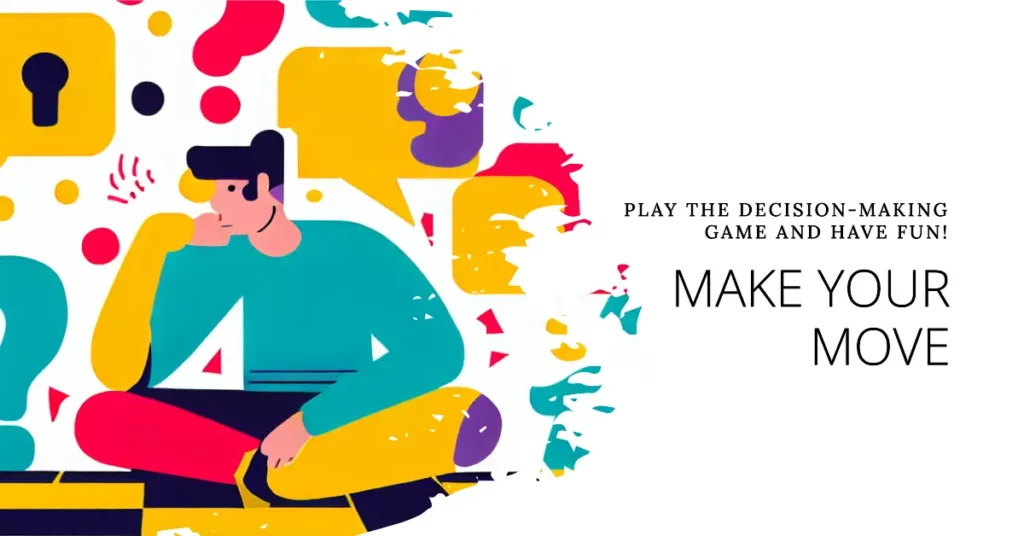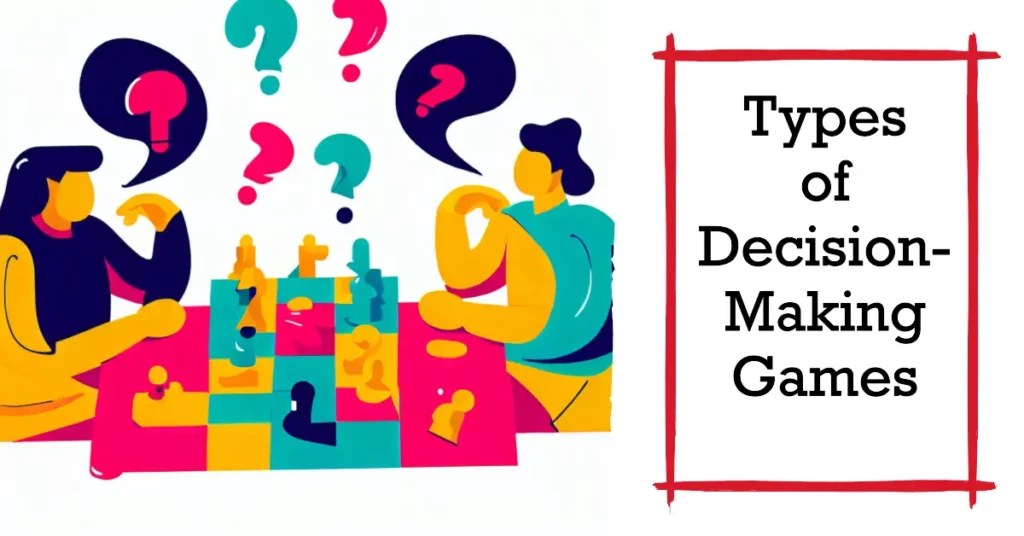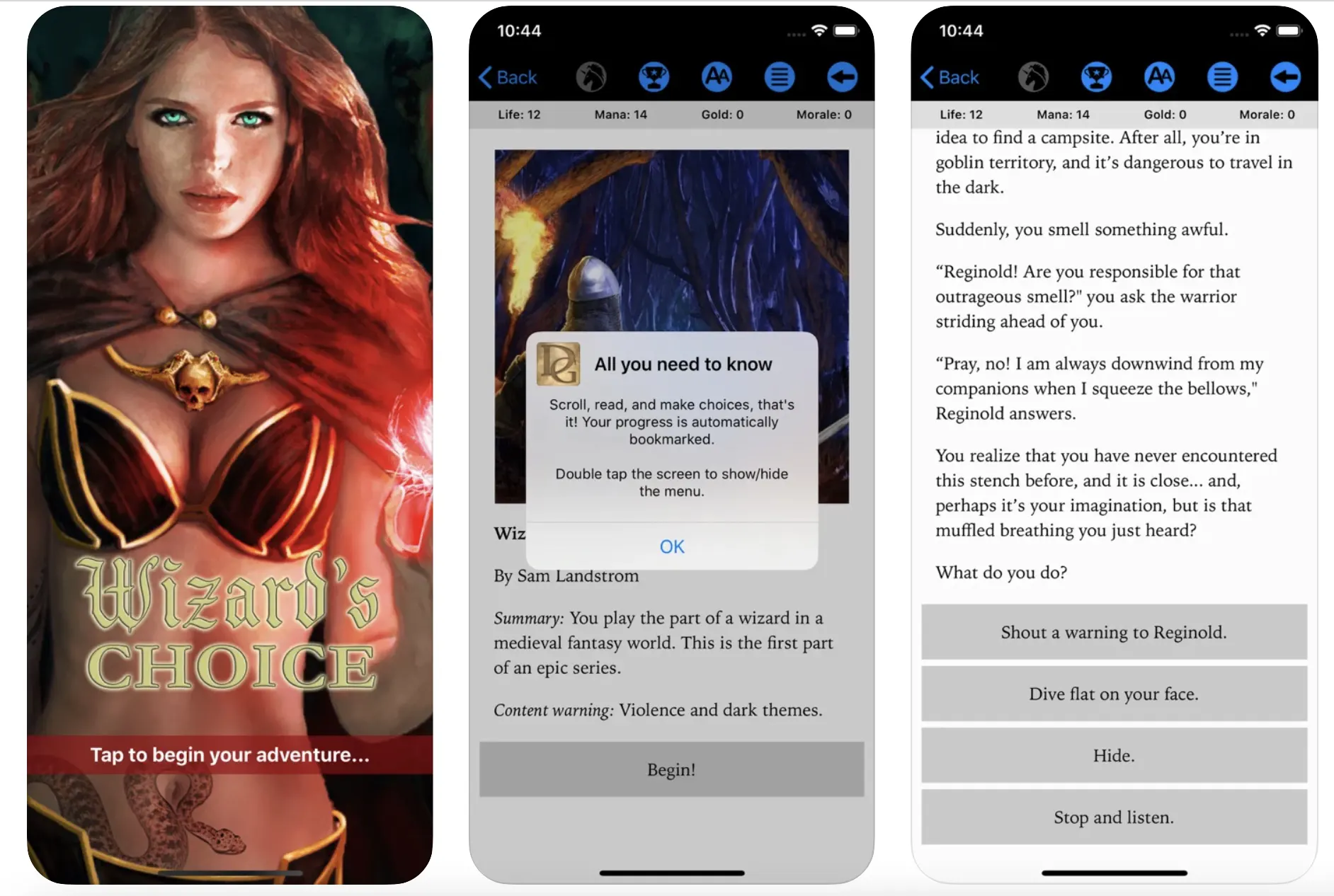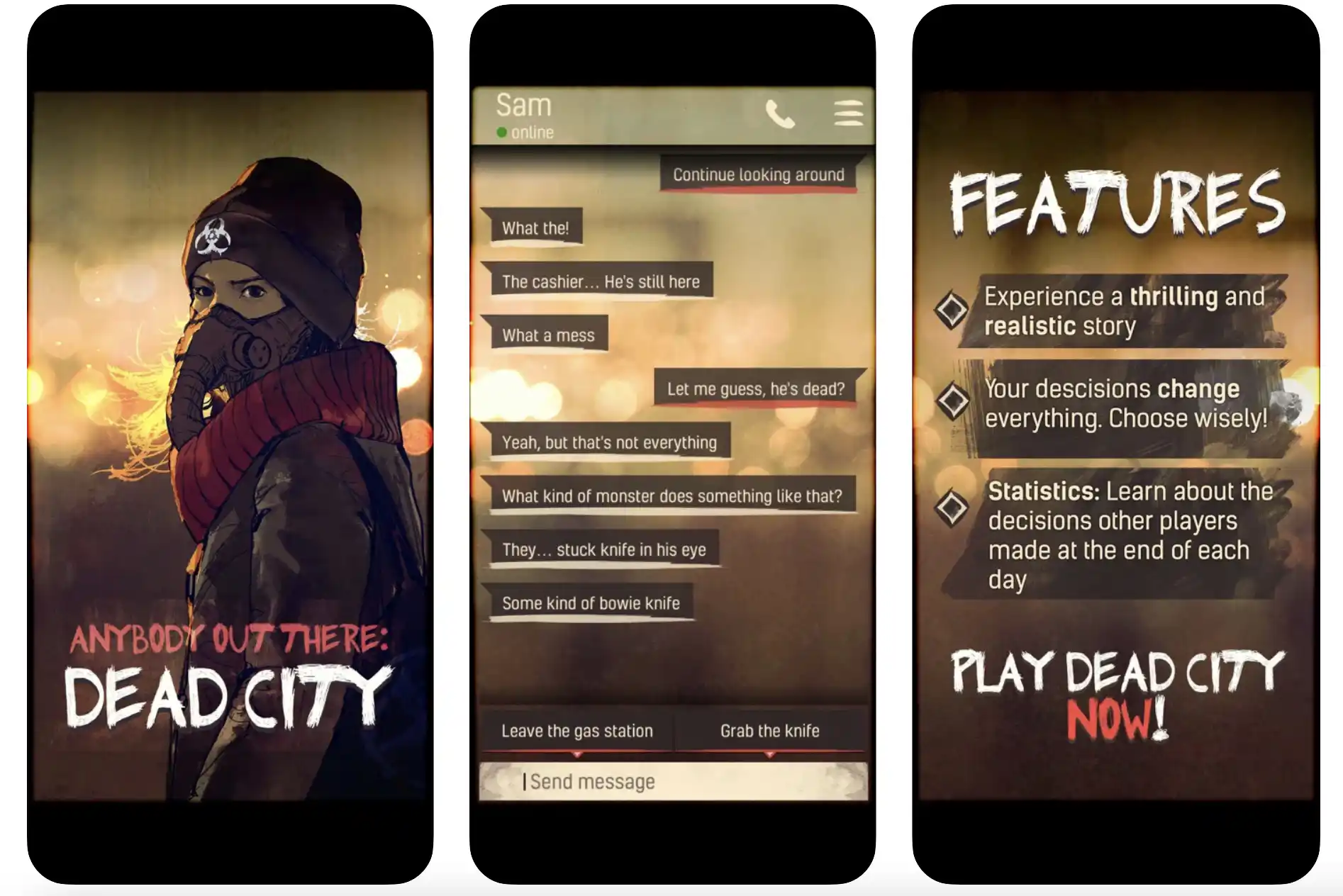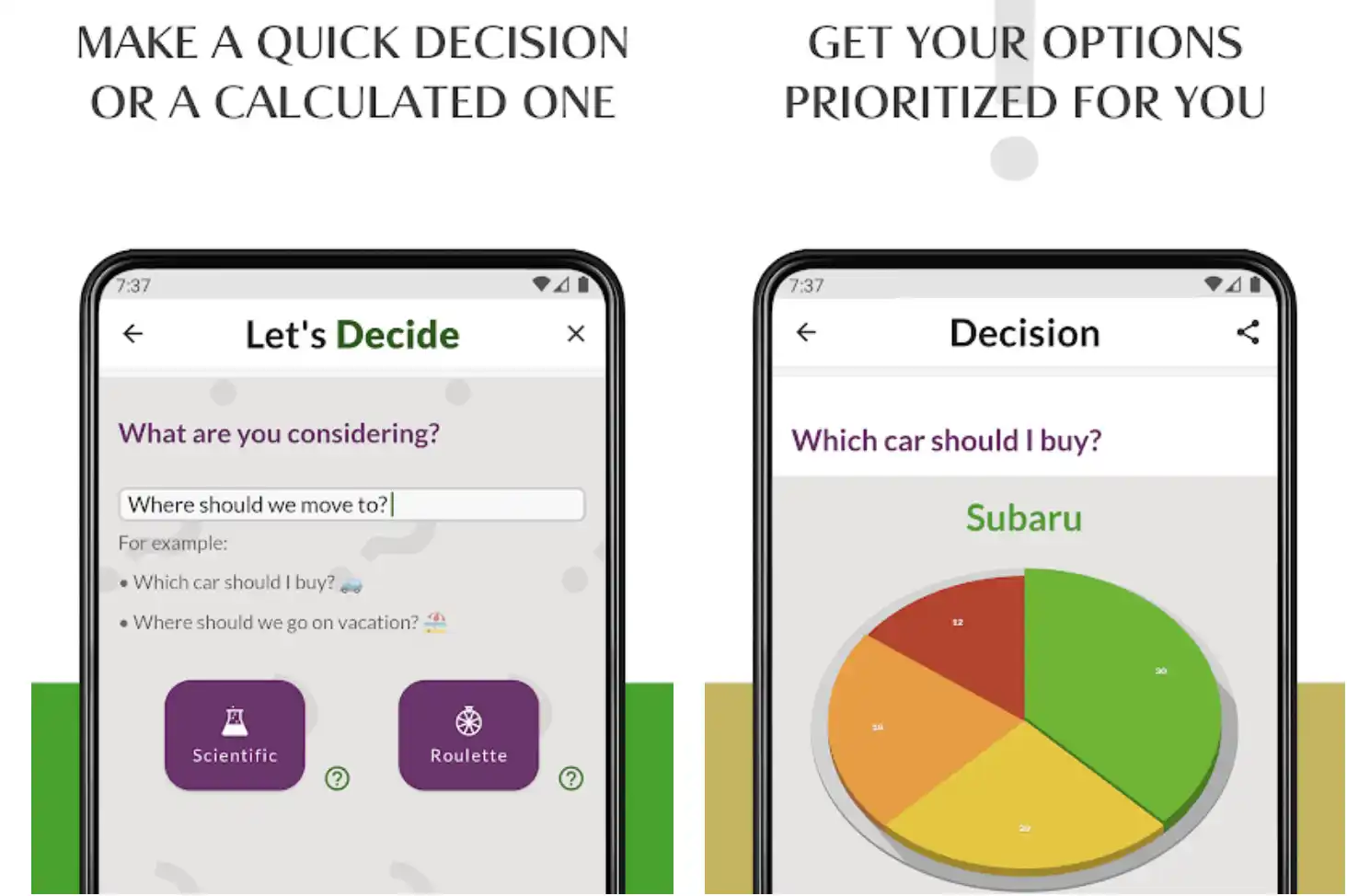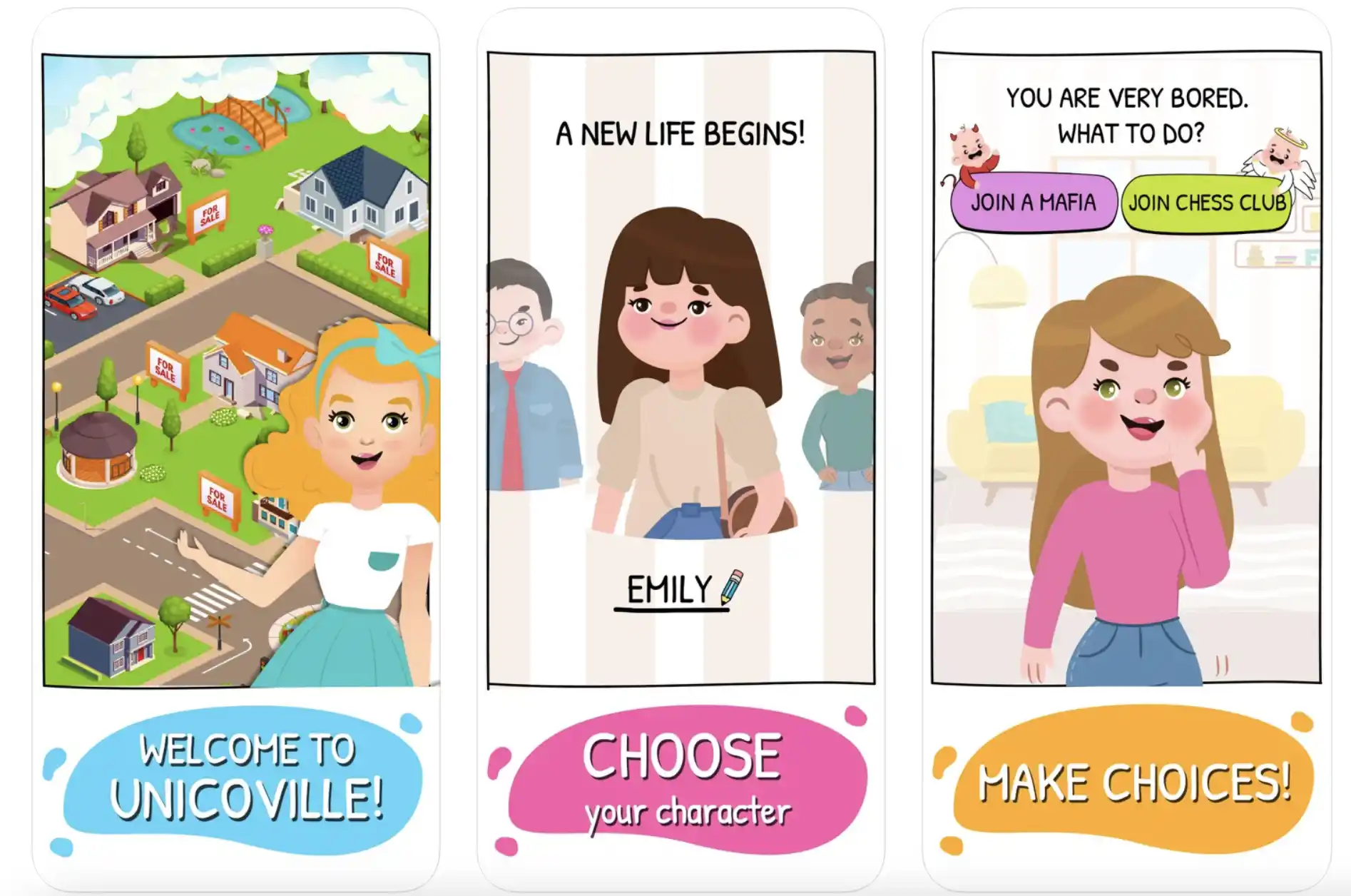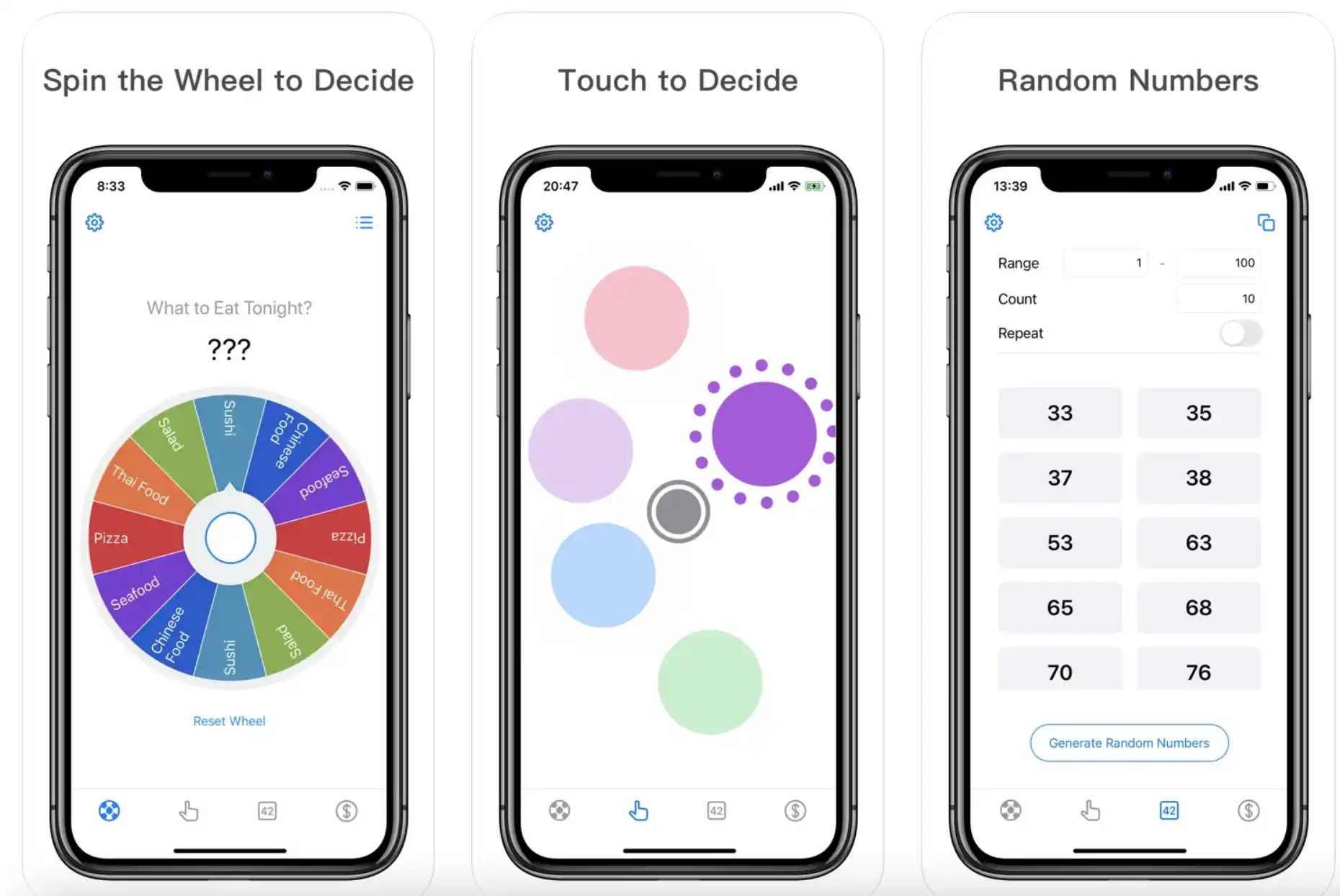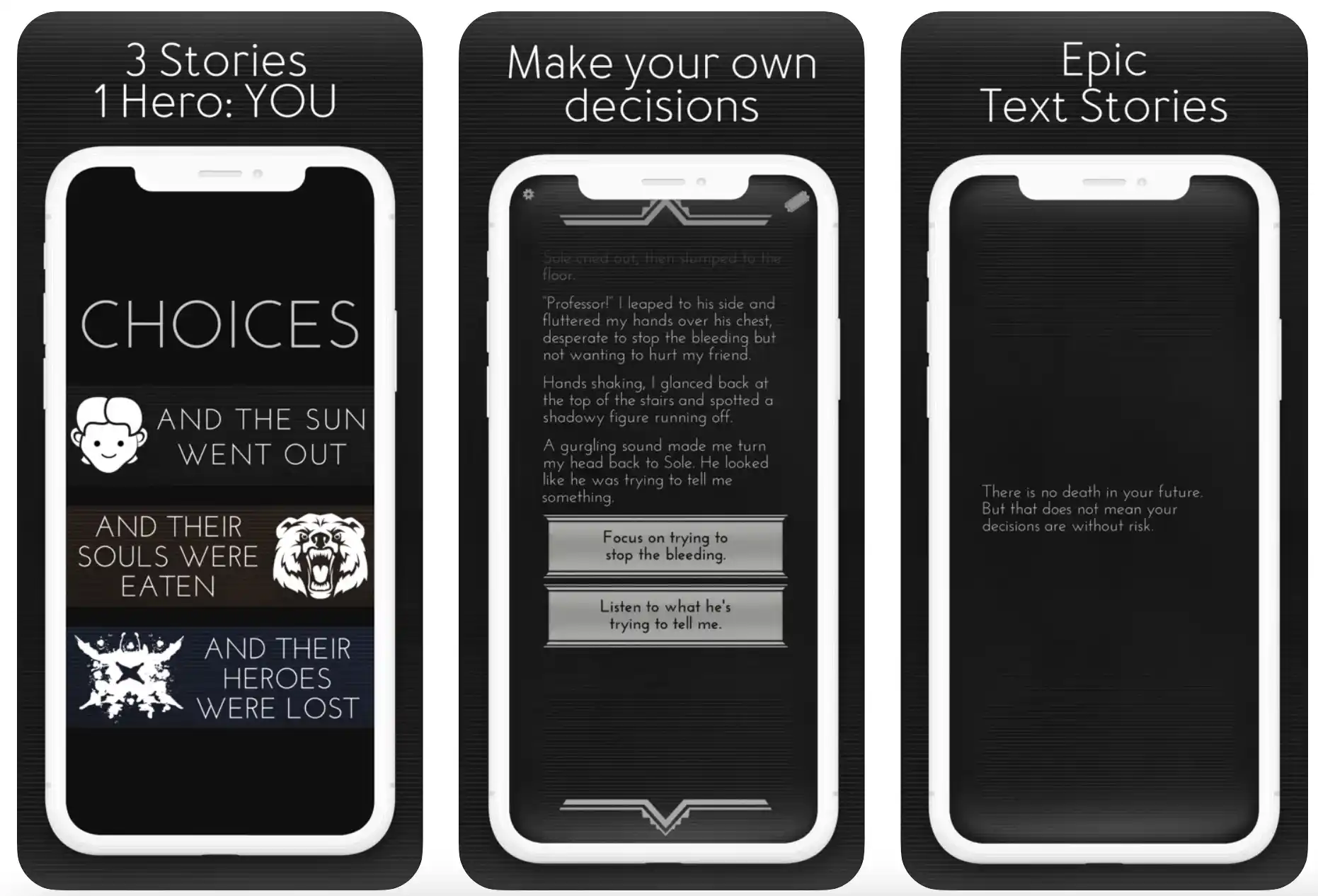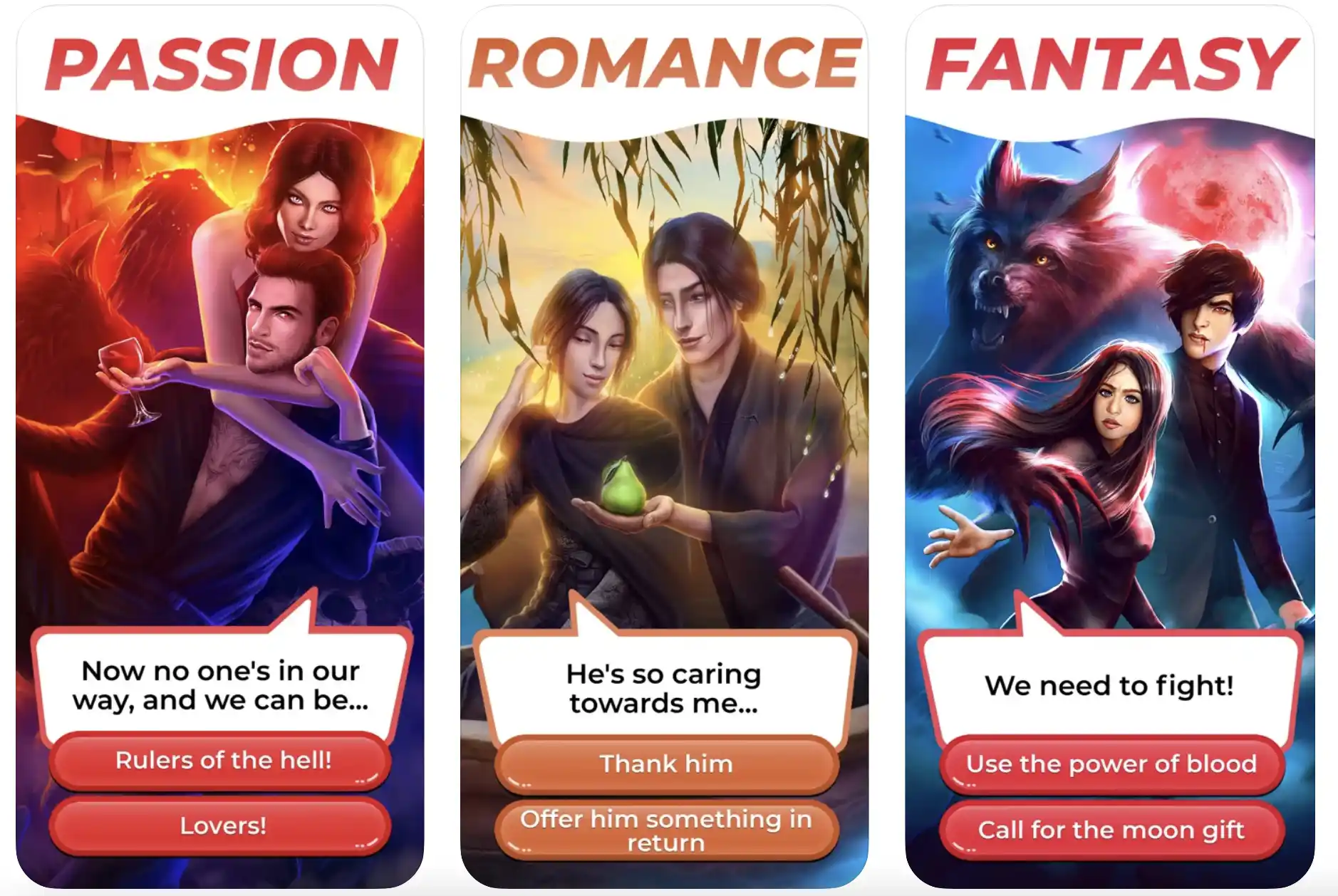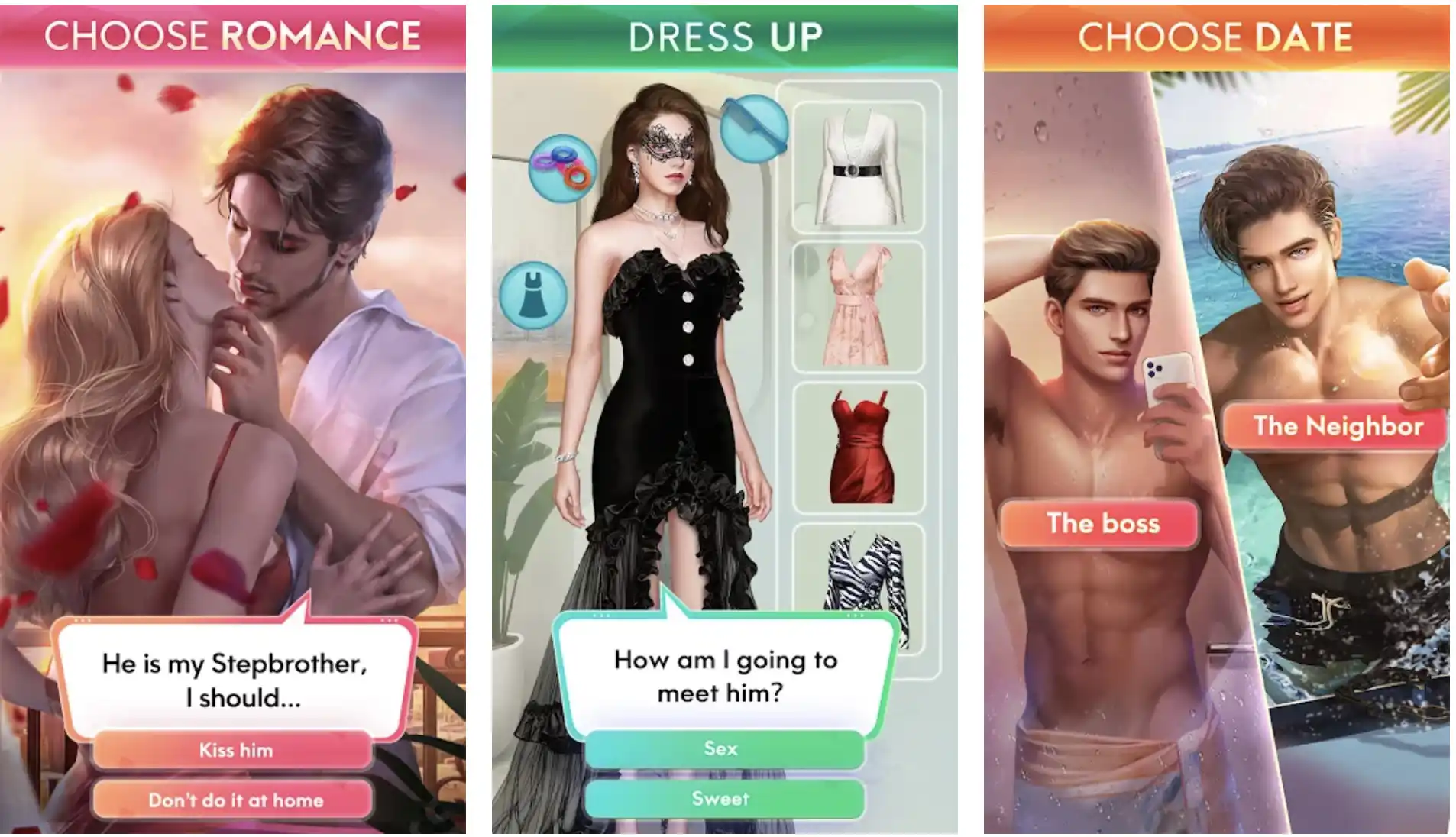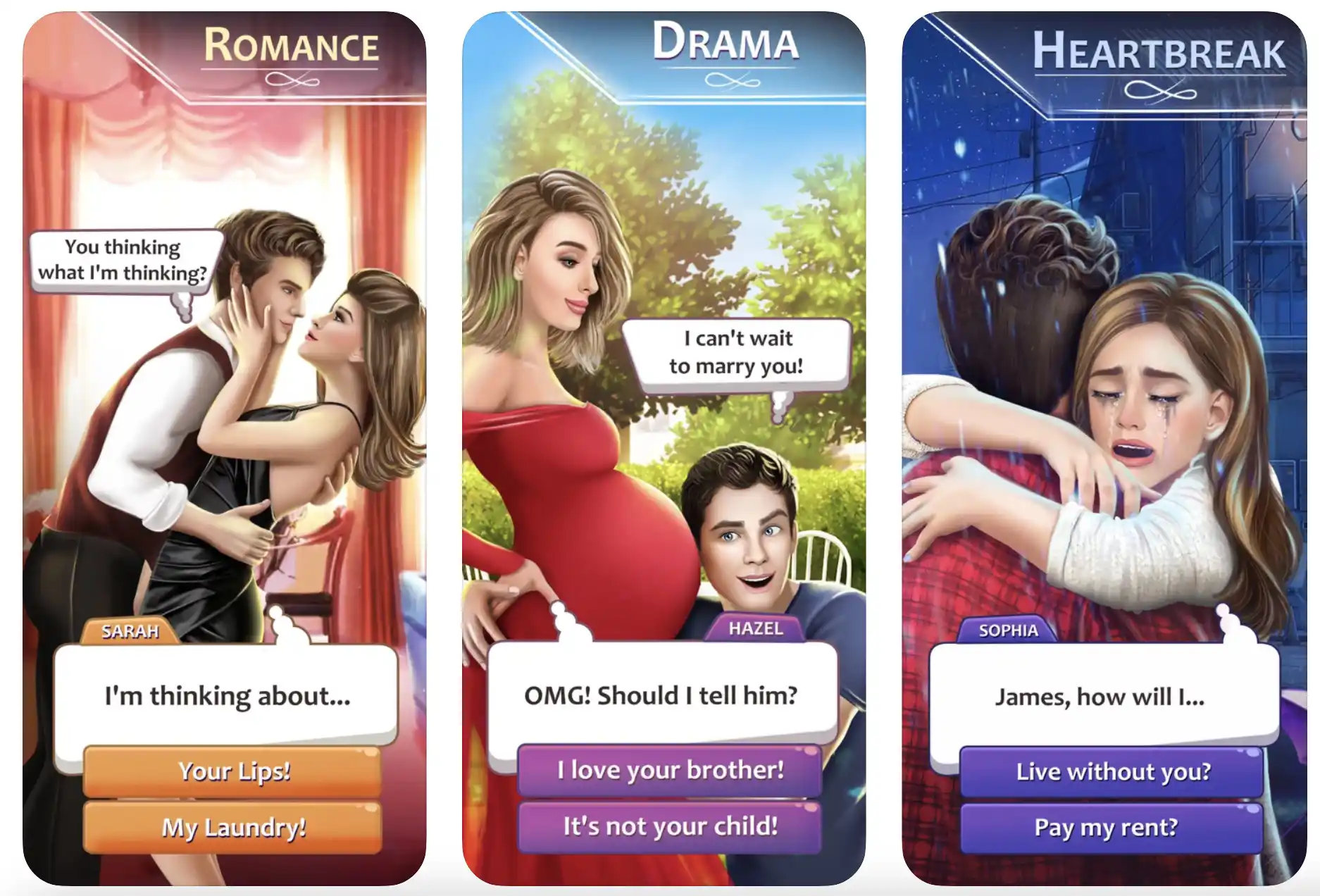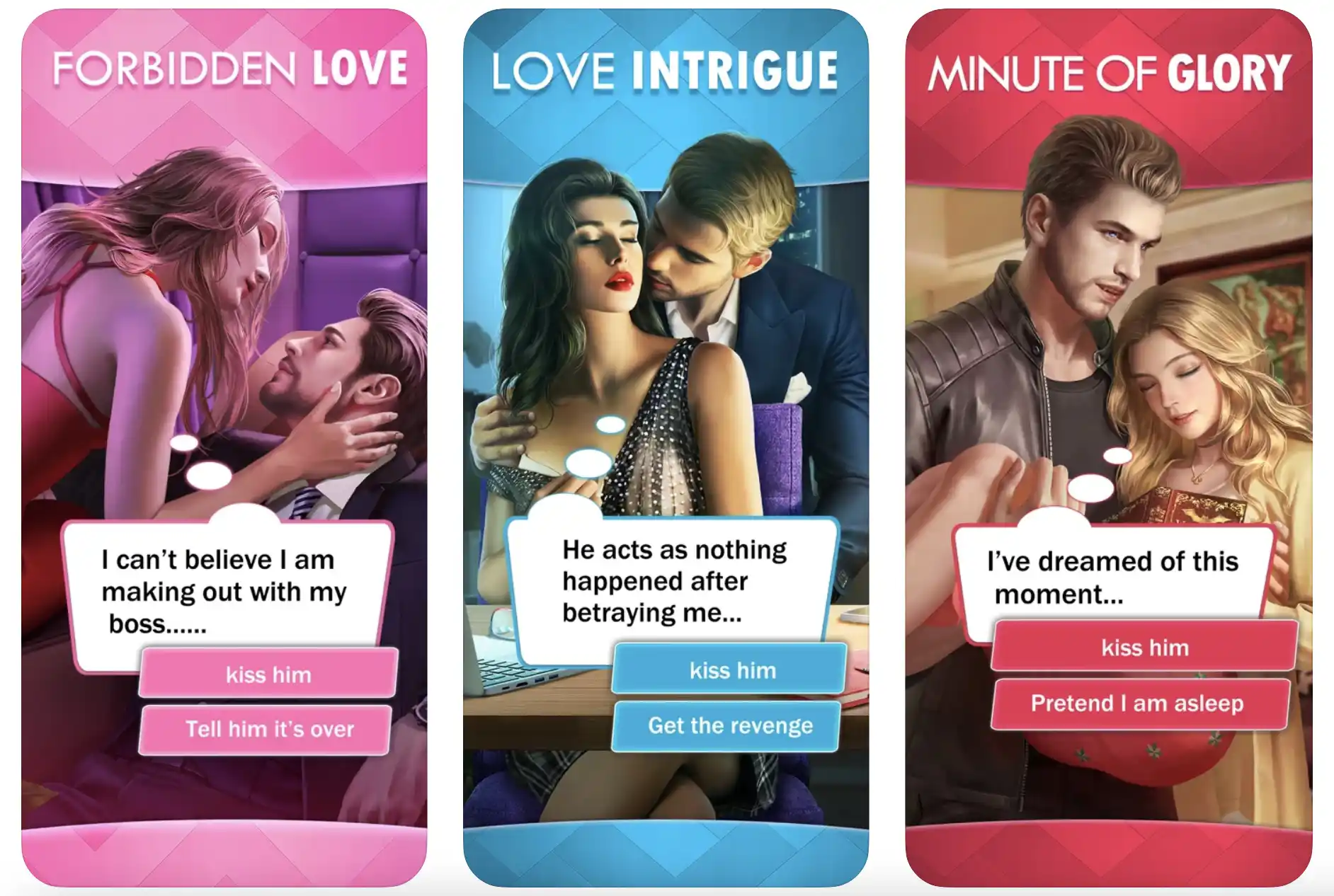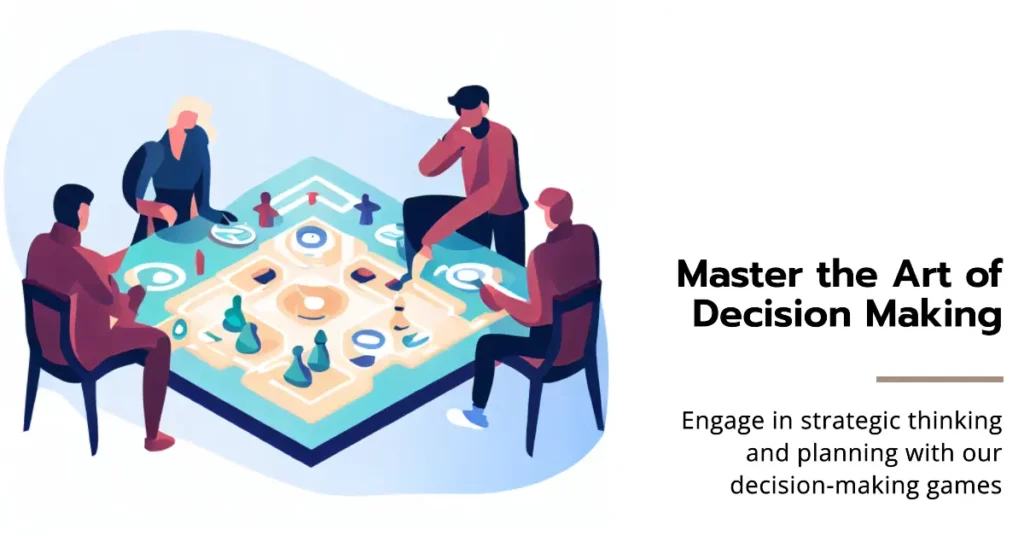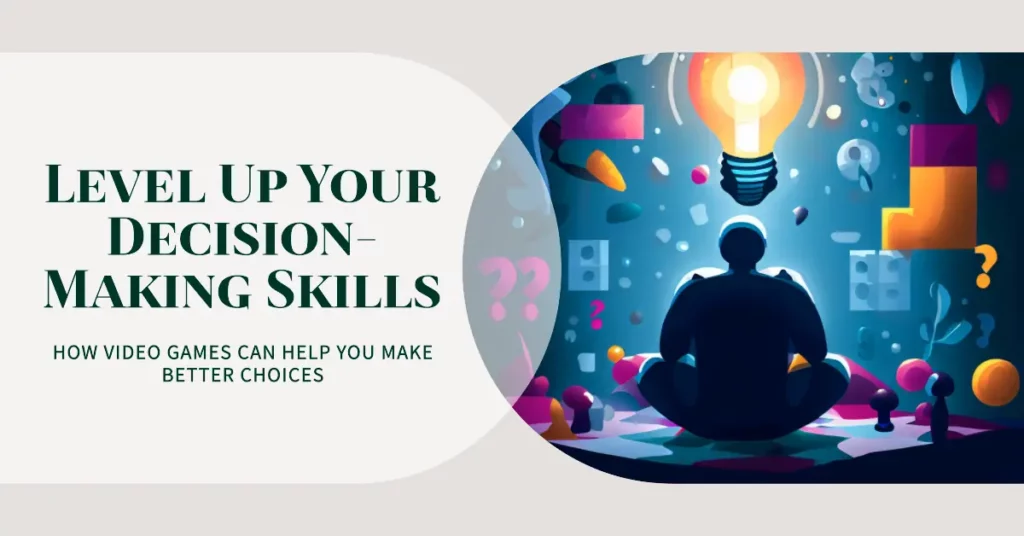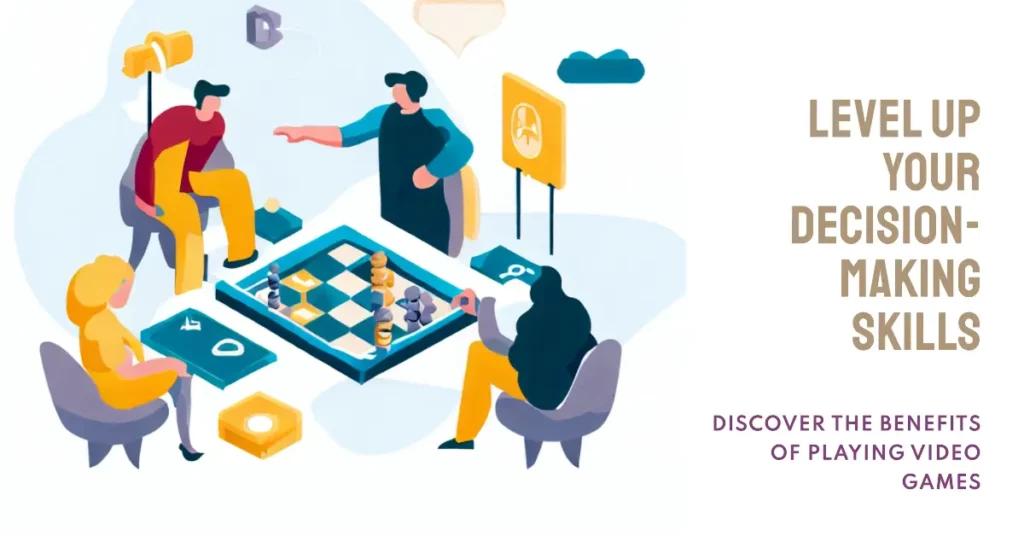We’ve all been there. Whether it’s choosing between job offers, deciding where to invest your hard-earned money, or figuring out which university to attend – making decisions is daunting.
The pressure to make the right call often leads to stress, uncertainty, and even decision paralysis. The root of this issue?💁 Many of us were never taught how to make smart, calculated decisions.
Poor decision-making can lead to a cascade of negative outcomes. Missed opportunities, regret, and detrimental impact on personal or professional life are just a few.
It’s frustrating when our choices don’t pan out as we’d hoped, even more so when we don’t know what we could have done differently to achieve a better result.
That’s where decision making games come in. These tools cleverly combine learning and fun, helping you enhance your decision-making skills while having an entertaining time.
You don’t have to tackle this challenge alone or in a dull, traditional learning environment. Decision-making games can guide you towards improved decision-making abilities through an engaging and interactive platform.
They teach you to think critically, assess different outcomes, and make informed choices that will be beneficial in the long run.
In this article, we’ll delve into some of the best decision-making games available today, helping you transform the daunting process of decision-making into an enjoyable and productive experience.
Let’s level up your decision-making skills and make choices leading to your desired outcomes.
The Benefits of Decision-Making Games
In cognitive development, decision-making games have become powerful tools for enhancing critical thinking, strategic planning, and risk management skills. These games, with their immersive gameplay and complex scenarios, offer numerous benefits that extend beyond mere entertainment.
By immersing players in intricate decision-making processes, these games stimulate cognitive faculties and foster invaluable skills applicable to real-life situations.
One notable advantage of decision-making games is their ability to enhance analytical thinking. Players are required to deconstruct complex problems, analyze information, and identify the underlying factors that influence outcomes. These games also nurture problem-solving skills, challenging players to devise innovative solutions and navigate obstacles.
The deliberate evaluation of consequences associated with each decision encourages players to consider potential risks and rewards. Furthermore, decision-making games foster the development of strategic planning abilities. Players must establish clear goals and devise comprehensive action plans to achieve them.
Long-term thinking, resource allocation, and adapting to dynamic situations are crucial elements of these games, cultivating a strategic mindset. Another valuable aspect of decision-making games is their ability to hone risk assessment and management skills.
Players learn to identify potential risks, weigh the pros and cons, and make informed choices under uncertainty. The iterative nature of these games allows players to learn from their mistakes and refine their decision-making strategies.
In conclusion, decision-making games offer many benefits that enhance cognitive skills and provide practical value. Individuals can refine their analytical thinking, strategic planning, and risk management abilities by engaging in these games, ultimately empowering them to make informed decisions in real-life scenarios.
Types of Decision-Making Games
Regarding decision-making games, diverse options are available to engage and challenge players. These games come in various formats, each offering a unique and immersive experience.
Let’s explore some of the types of decision-making games that are popular among enthusiasts.
1. Board Games:- Board games have long been a staple in decision-making games. They provide a tangible and interactive experience where players make strategic choices within rules and constraints. Games such as Settlers of Catan and Pandemic require players to make critical decisions, allocate resources, and navigate complex scenarios.
2. Video Games:- With the advancement of technology, video games have evolved into a powerful medium for decision-making. These interactive digital experiences allow players to make choices that shape the narrative and impact the game’s outcome. Titles like The Witcher 3: Wild Hunt and Fallout series immerse players in richly detailed worlds where decisions have far-reaching consequences.
3. Role-Playing Games (RPGs):- RPGs provide a collaborative and immersive experience where players assume the roles of fictional characters and make decisions that shape the story. Games like Dungeons & Dragons and Pathfinder require players to navigate through quests, interact with non-player characters, and make choices that affect the adventure’s outcome.
In summary, decision-making games offer diverse experiences, from traditional board games to immersive video games and collaborative RPGs. These games provide a platform for players to engage in strategic decision-making, critical thinking, and problem-solving, making them an excellent choice for those seeking interactive and intellectually stimulating experiences.
Here, we have prepared a list of some of the best ones on Android and iPhone –
Best Decision Making Games To Make a Choice👌
1. Wizard’s Choice (Choices Game)
Designed based on an interesting medieval era, Wizard’s Choices game is our number one pick among the best decision-taking games. The game is available on both the Apple Store and Google Play Store as a series of RPG games and offers you a very impressive, engaging story.
The app challenges you to make the right decisions at the right time and stay alive as long as possible. You also have to manage your power and find hidden treasures throughout different phases of the game.
Taking the right decision, more importantly at the right time, is crucial for your fate in the game. Read the story carefully and choose the best options to ensure your story ends on the right note.
In addition to finding treasures and managing your power, you are also challenged to smite different evils throughout the game.
The cool, interactive graphics of the game make it one of the best decision making games. And the best part I have liked about the game is that it’s more than playable, even for visibly challenged individuals!
Features of Wizard’s Choice (Choices Game):-
- It allows you to read interesting stories and make the best decisions
- You can track your health, morale, manna, gold, and more in the game
- Results are directly impacted based on your decisions
- Score highly and get the top ranks at the end of the game
- Easily accessible to even visibly impaired individuals too
Devices – Android and IOS
Ratings on Google Play Store – 4.7 / 5 | Ratings on Apple Store – 4.6 / 5
Download the App from Google Play Store
Download the App from Apple App Store
2. 2048
2048 is a popular puzzle game where players slide numbered tiles on a grid to combine them and reach the elusive tile with the number 2048. It is an excellent decision-making game as players must strategically plan their moves to merge tiles efficiently while preventing the grid from becoming too cluttered. Success in 2048 depends on making thoughtful decisions about tile placement and movement, making it a challenging and engaging game for those who enjoy strategic thinking and problem-solving.
Features of 2048 Us
- No downloads required
- Free
- User-friendly interface
Devices – Desktop and Mobile-friendly site
3. DEAD CITY – Choose Your Story
Sam is in serious trouble and is facing all types of unexpected scenarios. He needs your help, and it’s a matter of his survival for the next few days! Are you brave enough to make the right decisions and ensure Sam’s survival?
DEAD CITY is an incredibly interesting interactive chat-based game that is incomplete without a smart player that can make the right decisions at the right time.
For strangled Sam, you are the only person he can rely on to get out of the mess! Play an important role in Sam’s survival and live up to the expectations! Make all your choices very carefully, as they can directly impact the outcome of the story and can even be life-threatening for Sam!
The game’s user interface is based on a simple yet highly interactive chat messenger, and the whole chat revolves around how you can be the savior for Sam.
You don’t have so much time to decide; you must answer all the messages immediately and ensure you choose the right option when it matters most.
So, challenge yourself as a superhero, analyze all the scenarios, and try to make the right decisions! Rescue Sam from trouble and become a popular character in the game!
Features of DEAD CITY – Choose Your Story:-
- Interactive chat-based decision-making game
- Experience a realistic and thrilling story
- Teaches you the value of the right decisions at the right time
- Statistics to understand the impact of both right and wrong decisions
- All the features of the game are available free of cost
Devices – Android and IOS
Ratings on Apple Store – 4.7 / 5 | Ratings on Google Play Store – 4.6 / 5
Download the App from Google Play Store
Download the App from Apple App Store
4. Choice Pro – Decision Maker
Another exciting decision-making game that helps you to learn decision-making with simple, interactive, and interesting tasks. You can use a powerful combination of Science and Luck to try and choose the best options for you.
From buying a new car to ordering pizzas and tacos for lunch, and watching different movies, the Choice Pro app challenges you to do the right thing at the right time.
There are so many options to choose from in the app! You can spin the wheel for less important ones if you cannot make the best decision.
The game also teaches you not to rely solely on the wheel regarding an important decision. Instead, it inspires you to take the scientific approach and move in the right direction.
The app works around a decision matrix and empowers you to choose the best option when it matters the most – yes, even in real life!
You can also record and share your progress with your friends and colleagues! Show them how you are improving as a decision-maker, and that too, with a simple yet very effective game.
Features of Choice Pro – Decision Maker:-
- Make quick, calculated decisions for the best results
- Get the options prioritized based on your preferences
- Confused? Let fate take your decisions with spin-wheel
- Track your past decisions and keep learning every day
- Simple, clean, glitch-free user interface that also supports the night mode
Device – Android
Ratings on Google Play Store – 4.6 / 5 | 5,000+ Downloads
Download the App from Google Play Store
4. Episode
How can’t I include the popular Episode game in the list of some of the best decision based games? After all, the game allows you to digitally live different stories with drama, adventure, romance, love, and more.
How about imagining yourself as a character in an amazing, intriguing drama? Why would you do so if you can live the character right on your device?🧐
The Episode game enables you to do just that with more than 150,000 gripping stories and challenges you to make the most important decisions.
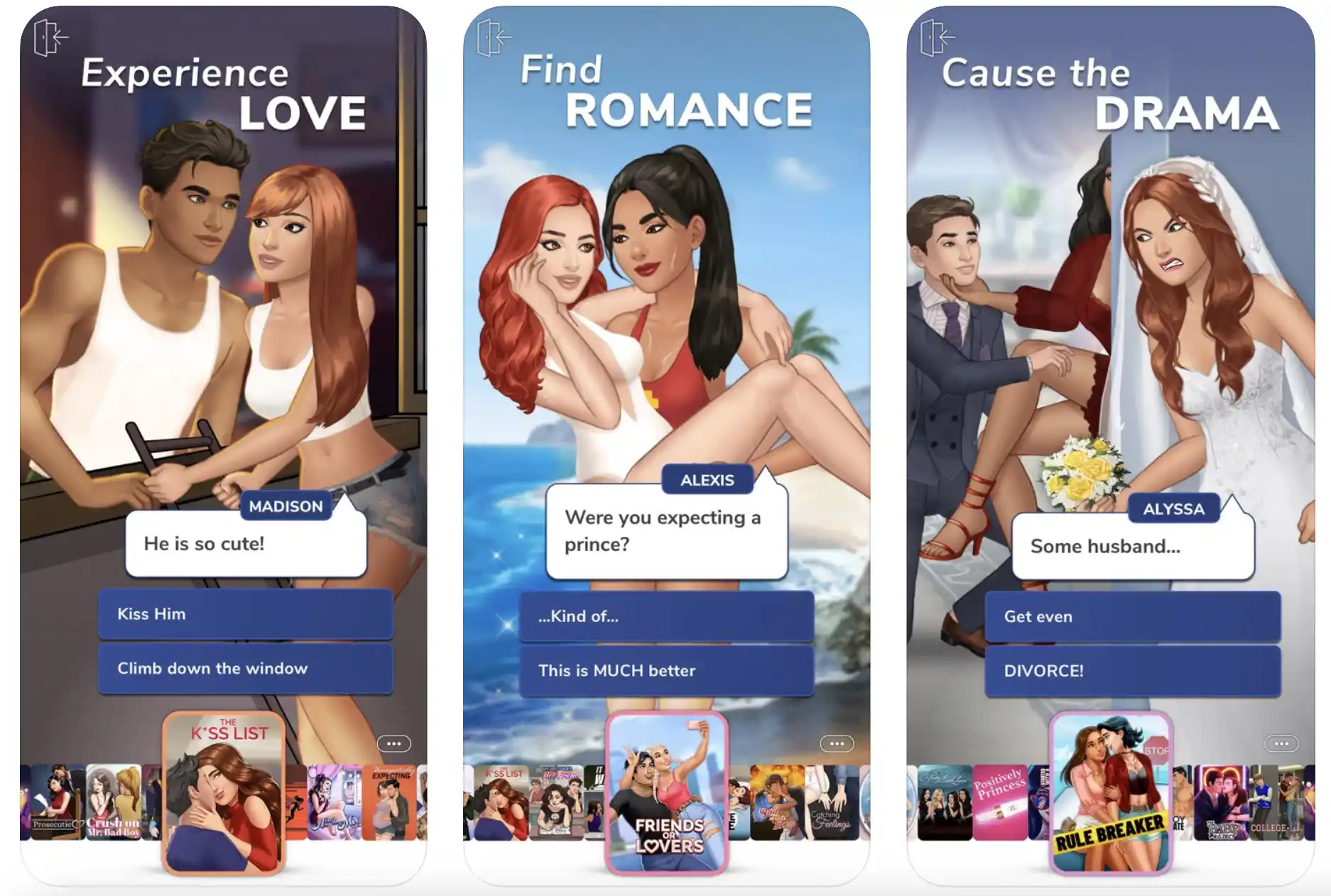
Develop interesting relationships with some of the most popular characters – and your decisions are going to be decisive – whether they become your Romeos or they end up becoming your rivals, it all depends on your options.
It’s in your hand to change your fate with your decisions. Try the game and immerse yourself in a diverse world with endless options.
Features of Episode – Choose Your Story:-
- Make decisions that can be impactful
- Design your own interesting character
- Choose the story that excites you the most
- Join a community of millions of users with a myriad of characters
- Create your own stories and become a popular creator
Devices – Android and IOS
Ratings on Apple Store – 4.7 / 5 | Ratings on Google Play Store – 4.3 / 5
Download the App from Google Play Store
Download the App from Apple App Store
5. Life Choices: Simulation Game
If you are bored with old-fashioned simulation games, here is an enthralling decision-making simulation game for you!
The game is designed around the reconstruction and restoration of a town, and you have to make the best decisions at the right time to help Unicoville with all the tasks related to construction and repair.
You have many options regarding characters, and you can choose to become anyone. Choose the job that suits you best and play an important role in the game!
From building a house to building the entire town, you have unlimited options to showcase your skills!
You can explore different characters, find the most suitable one, get married, and have a family! If you are good enough at developing your bond, you can even plan to make a child.
What more? The simulation game also allows you to help your child grow in the town. You can work as a scientist, cook, mafioso, doctor, scientist, or even a president!
And if you are not interested in any job at all, you can play a role as a hustler and earn money with side jobs! All in all, a game that entirely depends on how good you are at decision-making!
Features of Life Choices: Simulation Game:-
- Make interesting choices to get rid of your boredom
- Choose your most preferred character
- Decide what you want to become or become a hustler
- Follow a wide range of different stories
- Discover and decorate the town in a way you want
Devices – Android and IOS
Ratings on Apple Store – 4.7 / 5 | Ratings on Google Play Store – 4.3 / 5
Download the App from Google Play Store
Download the App from Apple App Store
6. Fictions
Take the right decision and choose your path in the exciting Fictions game. The game allows you to make real choices based on different situations, discover possibilities, complete enticing puzzle gameplays, and directly impact the outcomes!
Instead of those old-fashioned, simple, and tap-based visual novel games, the Fictions game offers you a lot of engaging and compelling options.
There are interactive stories about love, betrayal, supernatural powers, friendships, and more. The game takes you through different scenarios and challenges your decision-making abilities to impact the results.
Make the right decisions that matter! Find hidden facts and objects, look around for different pictures and combinations, assemble them correctly, and open the mysterious secret drawer!
Assemble broken pieces, go through the maze, and meet different characters! Decide what’s the right option according to the situation.
Fall in love with your favorite character. Discover the dark and dirty underworld, find the criminals, and ensure justice! In short, the Playbook game offers many interesting things to enjoy and participate in.
Features of Fictions: Choose Your Emotion:-
- A very engaging and interactive decision-based gameplay
- Follow your instinct and make the right decision at the right time
- Become a police officer and investigate crime or become a romantic hero and fall in love
- Allows you to select different stories based on multiple genres
- Customize your characters using multiple dresses, hairstyles, makeup, and more
Devices – Android and IOS
Ratings on Apple Store – 4.7 / 5 | Ratings on Google Play Store – 4.0 / 5
Download the App from Google Play Store
Download the App from Apple App Store
7. Tiny Decisions
Tiny Decisions game is all about easy, simple, and fun decision-making. All you have to do is to ask your question, select from multiple options, and spin the wheel to get instant and random answers!
Make quick decisions when you get confused about some less important things in your life. You can even make and customize your wheel!
Touch to decide the best option for you, generate numbers randomly, or even flip a coin with two options. The app will assist you with some very simple yet handy tools.
The app also comes with built-in decision templates, and you can choose the best one according to your situation. The game’s beautiful theme and multiple colors make it one of the free decision making games.
If you cannot decide which movie you want to watch or what you should eat on the weekend, you can flip a coin, and the game will help you choose!
The Tiny Decision game has helped millions of people choose the right options when it mattered the most. And there is no reason why you can’t get the best out of it too!
Features of Tiny Decisions:-
- Allows you to create customized decisions according to different situations
- Built-in decision templates are available
- Select non-repeating options to avoid the same answers in different scenarios
- Interactive and engaging user interface with colorful themes
- It enables you to change the setup of the wheel anytime
Devices – Android and IOS
Ratings on Apple Store – 4.7 / 5 | Ratings on Google Play Store – 4.0 / 5
Download the App from Google Play Store
Download the App from Apple App Store
8. Choices That Matter
Choices That Matter is one of the best games based on intriguing text adventures. The game is designed very similarly to the popular and classing Choose Your Adventure books.
I can guarantee that you can’t complete the entire game in one go! Do you think you can? Give it a try first, mate! There are numerous adventures in the game to explore and challenge yourself.
Adventures like “And The Sun Went Out”, “And Their Souls Were Eaten”, and “And Their Heroes Were Lost” are there in the app to give you the unique experience you expect from a decision-making game.
You can go on different investigations with the friendly AI companion “Moti”. Investigate various scenarios, challenge your decision-making capacity, and make the best decision to change your fate!
Uncover interesting conspiracies, travel the globe, and discover religious beliefs from ancient times! Find out who is killing the famous scientists and why the sun is disappearing randomly!
The “Choices That Matter” is promised to take you on a completely different level of adventure, and it’s you, who has to make the right decisions – all the time!
Features of Choices That Matter:-
- Go through various adventures and uncover the mysteries
- Travel across the world and see how it was in the ancient times
- Innovative characters throughout the game give you an interesting gameplay experience
- Uncover conspiracies at different levels and make the best, situation-based decisions
- One of the most epic, text-based decision-taking games
Devices – Android and IOS
Ratings on Apple Store – 4.6 / 5 | Ratings on Google Play Store – 4.4 / 5
Download the App from Google Play Store
Download the App from Apple App Store
9. Romance Club
Romance Club is an entertaining decision-making game with a huge collection of romantic stories that ask you to make the right decisions at the right time across the gameplay.
If you ever dreamed of seeing yourself as your favorite character, Romance Club is the game you should try. The game allows you to design your unique outfit, customize your interesting avatar, fall in love with some cute characters, romance, and develop relationships.
Your decisions are going to decide whether the characters are going to love you back or they will become your enemy!
There are multiple stories to choose from! Have you ever heard about the love story of Dracula? Yes, the fascinating story will give you a spine-chilling, adventurous experience related to the secrets of the Ottoman Empire!
The “Haven’s Secret” story contains angelic guys, Hellish lectures, and many temptations to break Heaven’s rules.
The “Legend of the Willow” story revolves around a woman trying and training to become a geisha! Is she going to achieve her goals? Or will she end up becoming something else? A werefox, a kitsune?🧐
Maybe a completely different character? It all depends on your decisions and, more importantly, when you make them!
Features of Romance Club – Stories I Play:-
- Interesting stories revolving around love, passion, fantasy, romance, and more
- Simple, interactive, and very smooth gameplay
- New episodes are added regularly
- Immerse yourself in a lively world of fascinating stories
- Choose your character, but your destiny depends on your decisions
Devices – Android and IOS
Ratings on Apple Store – 4.5 / 5 | Ratings on Google Play Store – 4.4 / 5
Download the App from Google Play Store
Download the App from Apple App Store
10. Romance Fate: Stories and Choices
Explore and encounter your own story of romance and love, make the right decisions, and be responsible for the outcomes. Romance Fate is the game that challenges you to play it responsibly as your own story.
Have you always been interested in fairy tales? Are you a huge believer in happy endings? Do you want to try both the good and bad aspects of romance?🧐
Are you ready to take on new challenges and adventures? Let’s play the Romance Fate game! The game lets you choose from various interactive stories and start controlling the outcome from the word go!
Every choice matters! Even a “yes” or “no” will make so much difference in the end. It’s you and only you, who will be responsible for whatever result you get.
In the game, you can fall in love with different characters and explore an enthralling world full of vampires, a mermaid, and a lost daughter.
Indulge yourself in exciting stories, select different paths, and enjoy your role! Choose the character and style that suits you the most.
From “Forbidden Affair” to “The Billionaire Neighbour”, “Obsession”, and “Love Practice”, the game is packed with some mind-boggling and engaging stories.
Features of Romance Fate” Stories and Choices:-
- Choose romance, date, or fate, and decide what’s best for you
- Select from a wide range of characters, avatars, dresses, and styles
- Enjoy multiple stories and be a part of them
- Experience different endings based on your decisions
- Simple, highly interactive, and exciting gameplay
Device – Android and IOS
Ratings on Google Play Store – 4.5 / 5 | 50,00,000+ Downloads
Download the App from Google Play Store
11. Decisions – Choose Your Stories
The stakes are high! Important things are on the line! What are you going to choose? It’s time to make the right decision with one of the best decision making games – Choose Your Store – Decisions!
Make the decisions and control your fate – good or bad, no excuse, no melodrama, nothing like that! Immerse yourself in an interesting world of compelling stories and become the boss.
Control things that you can control, or otherwise leave them to fate! No judgments, no holding back, no compromises – only decision-making!
Live your king-sized life in a completely different way! Make decisions that can directly affect a lot of things. The app allows you to select from various interesting characters and unforgettable titles.
It’s you, who will be responsible for all the decisions! Get ready for a memorable adventure of a lifetime. Enjoy the whirlwind romance in a way like never before!
Fall in love with millionaires, spies, bad boys, princes, and more! Go through a wide range of different characters, and have fun with spine-chilling twists
Features of Decisions: Choose Your Stories:-
- Stories in different genres, including romance, drama, heartbreak, flirting, and more
- Customize your character the way you want
- Interesting dress-up options
- Multiple episodes to choose from
- The visually engaging stories depend on your decisions
- Simple, smooth, and glitch-free user interface
Devices – Android and IOS
Ratings on Apple Store – 4.5 / 5 | Ratings on Google Play Store – 4.3 / 5
Download the App from Google Play Store
Download the App from Apple App Store
12. My Story: Choose Your Path
Here is another very absorbing, one of the best decision making games with some of the most interesting characters and great features. However, you have to be careful while playing the game!
One decision of yours can completely change the course of the game, and it can go either way – in your favor or against you, depending on how you make decisions!
Taking decisions is not only about progressing the right way in the game. It will also impact your character popularity, relationship with other characters, and more.
Using the “My Story” app, you can customize your character thanks to a wide range of options, including hairstyles, clothes, and other options related to your looks.
Experience the amazing college drama, become a rich heiress, and be an aspiring film star! Try different characters and experience the romance and thrills of different stories!
If you want something more interesting in the app, you can also opt for the premium subscription at very reasonable rates.
Features of My Story: Choose Your Own Path:-
- Choose from a wide range of stories in various genres
- Create your own story and become popular
- Customize your character with exciting clothes, hairstyles, accessories, and more
- Experience the drama from different aspects of life
- Explore more interesting features with a premium subscription
Devices – Android and IOS
Ratings on Apple Store – 4.5 / 5 | Ratings on Google Play Store – 4.0 / 5
Download the App from Google Play Store
Download the App from Apple App Store
13. Chapters: Interactive Stories
Choose your own unique stories with Chapters: Interactive Stories. The game lets you make your own decisions and directly impact the outcomes.
Read through the beautiful pages of the game, and find interactive stories based on your mood – from romance to suspense and mystery; there is so much to explore in the game.
The app is packed with a massive collection of stories on drama, comedy, adult, sci-fi, fantasy, romance, and a lot more! Chapters game combines stunning gameplay and a unique storytelling style from some of the most popular story writers.
You must decide on interesting and tough life decisions, including discovering secrets, falling in love, unraveling deep mysteries, etc. You must make your choices carefully to ensure you aren’t on the wrong side of the story.
If you are interested in reading novels, you have more than one reason to love this game. The gameplay is based on some enthralling, best-seller books like Paranormal Romance – Hit Series “Vampire Girls”, Drama Suspense LGBT – “Kidnapping The Princess”, Unforgettable Romance – “The Boy I Hate”, and more.
Features of Chapters: Interactive Stories:-
- Make the right decisions to impact the important outcomes
- Interactive stories in multiple genres
- Exciting gameplay on various bestseller novels
- Stories with info directly from the authors
- Simple, smooth, and lively gameplay
Devices – Android and IOS
Ratings on Apple Store – 4.4 / 5 | Ratings on Google Play Store – 4.1 / 5
Download the App from Google Play Store
Download the App from Apple App Store
Best Practices For Using Decision Making Games
Incorporating decision-making games into your learning or training initiatives can greatly enhance the effectiveness and impact of the experience. Following best practices for using decision-making games is important to ensure optimal results.
These practices will maximize engagement, promote critical thinking, and develop valuable skills.
Setting Clear Objectives and Goals:- Clearly define the learning objectives and goals you want to achieve through decision-making games. Whether it’s enhancing strategic thinking or improving teamwork, having specific objectives will guide the game selection and design.
Encouraging Critical Thinking and Analysis:- Promote critical thinking by encouraging players to analyze situations, evaluate information, and consider multiple perspectives. Encourage them to think deeply about the consequences of their decisions and the potential long-term impacts.
Promoting Collaboration and Communication:- Decision-making games provide excellent collaboration and communication opportunities. Encourage players to work together, share ideas, and discuss different approaches. This fosters teamwork, effective communication, and the exchange of diverse viewpoints.
Reflecting on Decisions and Discussing Alternatives:- After gameplay, facilitate reflection and discussion sessions where players can reflect on their decisions and the outcomes. Encourage them to explore alternative strategies and consider how they could have approached the situation differently.
Balancing Competition and Cooperation:- Strike a balance between competition and cooperation in decision-making games. While healthy competition can drive engagement and motivation, fostering a collaborative environment where players can learn from one another is equally important.
By following these best practices, you can create a dynamic and effective learning environment that harnesses the full potential of decision-making games. These practices encourage critical thinking, collaboration, and reflection, developing valuable skills and enhancing learning outcomes.
Real-Life Applications of Decision-Making Games
While decision-making games are often associated with entertainment and leisure, their value extends beyond play. These games have real-life applications that can benefit individuals and organizations in various contexts.
Let’s explore some real-life applications of decision-making games and how they can contribute to personal and professional growth.
Business and Leadership Training:- Decision-making games offer a safe and immersive environment for individuals to develop their business acumen and leadership skills. Players can practice making strategic decisions, managing resources, and navigating complex challenges through simulated scenarios. These games provide a valuable training ground for future business leaders.
Educational Purposes:- Decision-making games are increasingly used in educational settings to promote critical thinking and problem-solving skills. They allow students to apply theoretical knowledge in practical situations, enhancing their understanding of concepts and improving decision-making abilities across various subjects.
Personal Development and Self-Improvement:- Decision-making games can be powerful tools for personal growth. They encourage players to analyze their decision-making processes, evaluate alternatives, and learn from their outcomes. By engaging in these games, individuals can cultivate effective decision-making habits that translate into real-life situations.
Team Building and Group Decision-Making:- Decision-making games can foster collaboration and improve group dynamics. By working together to tackle complex challenges, teams can develop communication skills, enhance their ability to make collective decisions, and build trust among team members.
In conclusion, decision-making games offer practical applications that extend beyond entertainment. They have the potential to enhance business skills, support educational objectives, facilitate personal development, and strengthen teamwork.
By embracing decision-making games, individuals and organizations can harness their transformative power and achieve tangible benefits in real-life scenarios.
How Do Video Games Improve Decision-Making Skills?
Video games have evolved into much more than just a form of entertainment. They offer immersive experiences that can enhance various cognitive skills, including decision-making. But how do video games improve decision-making skills? Let’s delve into the mechanisms behind this phenomenon.
Complex Scenarios and Consequences:- Video games often present players with complex scenarios where decisions have immediate and long-term consequences.
This dynamic environment encourages players to think critically, evaluate options, and make decisions that impact the game world. The iterative nature of gameplay allows players to learn from their choices and refine their decision-making strategies.
Real-Time Decision-Making:- Video games often require players to make real-time decisions, enhancing their ability to think quickly and act decisively. This aspect of video games strengthens cognitive skills such as rapid problem-solving, prioritization, and adaptability.
Risk Assessment and Management:- Many video games incorporate risk assessment and management elements. Players must weigh the potential risks and rewards of different actions, strategize accordingly, and make informed decisions to progress in the game. This helps develop skills related to risk analysis, cost-benefit evaluation, and decision-making under uncertainty.
Strategic Thinking and Planning:- Video games frequently involve elements requiring players to plan and execute their actions strategically. This encourages players to anticipate future outcomes, develop action plans, and adjust their strategies as new information becomes available. These aspects cultivate strategic thinking, goal setting, and resource allocation skills.
In conclusion, video games provide a platform for improving decision-making skills through complex scenarios, real-time decision-making, risk assessment, and strategic thinking.
By engaging with these games, players can enhance their cognitive abilities, develop critical thinking skills, and apply these newfound skills to real-life decision-making situations.
Which Video Games Help You in Decision-Making?
Regarding improving decision-making skills, certain video games stand out for their ability to challenge and develop this important cognitive ability. These games provide engaging and interactive experiences that require players to make strategic choices and navigate complex situations.
Let’s explore which video games help you in decision-making and why they are effective.
Civilization VI:- This popular strategy game puts players in control of building and managing civilizations throughout history. It requires strategic planning, resource management, and diplomatic decision-making. The game’s depth and complexity allow players to hone their decision-making skills.
The Witcher 3: Wild Hunt:- This immersive role-playing game presents players with morally ambiguous choices that impact the game’s narrative and outcomes. It encourages players to consider the consequences of their decisions, weighing the moral implications and potential repercussions. This game promotes critical thinking and moral reasoning.
XCOM 2:- As a turn-based tactical game, XCOM 2 challenges players to make critical decisions during intense combat scenarios. Players must assess risks, allocate resources, and strategize their actions to outmaneuver enemies. This game enhances decision-making under pressure and fosters adaptive thinking.
Papers, Please: In this thought-provoking game, players take on the role of an immigration officer tasked with making decisions that affect people’s lives. It stimulates the ethical dilemmas and moral trade-offs involved in decision-making. The game promotes empathy, critical analysis, and ethical reasoning.
📗 FAQ’s
What is the best decision-based game?
Wizard’s Choice, DEAD CITY, Choice Pro, Episode, Life Choices, etc. are some of the best decision-based games you can play and impact the overall impact of incidences in the games based on your decisions.
What games help with decision-making?
Sudoku, Chess, Poker, Choice Pro, Fictions, Life Choices, etc. are some of the best and most intriguing games and are designed to help you to test and enhance your decision-making abilities.
Can you play the same game on iOS and Android?
You can only play the same game on Android and iOS if the developer has designed the same game for both platforms. Otherwise, you don’t have any other option to sync your iOS games on Android or vice versa.
Is there an app to make decisions for me?
Tiny Decisions is an exciting application that makes decisions effective, fun, and easy. You have to input your question, add or import points, and spin the wheel to get the most appropriate answer.
What can help me make a decision?
You have to take care of certain things to make the right decisions. First, control your stress, give yourself some time before making decisions, think about both positives and negatives, and check how your decision affects your goals and values.
Considering all the possibilities is also very important. If you can, talk it out with someone you trust. Keep track of your decisions to understand if they are right or wrong in the future.
How do you make a decision when you can’t decide?
Following your instinct is the best way to decide when you cannot decide. If things are unclear, try meditation and talk to yourself in a peaceful environment.
Think about your decision and how it can affect your life. Ask yourself some important questions related to your decisions, and recognize the reactions from your inner self. Try planning well in advance to ensure your decisions are correct and impactful.
What are the 7 steps in decision-making?
Identifying your decision, gathering relevant information, identifying alternative options, weighing the pieces of evidence, choosing among multiple alternatives, taking the most appropriate action, and reviewing your decision and its consequences are 7 highly important steps in decision-making.
How do I get a hard decision in life?
Sometimes, you have no other option but to take hard decisions in your life. Instead of looking in the moment, make a picture of how your decision will change your future.
Listen to your mind instead of your heart. Consider how you can survive if you are disappointed with negative outcomes. Always respect the ideas and influences of others. Always go with what you know instead of moving ahead in the darkness.
Is there a mental disorder for being indecisive?
Indecisiveness is one of the most important aspects of being hesitant and low on confidence. However, if someone cannot take any decision, it might be possible that they are suffering from a diagnosable mental disorder known as “Aboulomania”. It is a mental condition in which a person slowly but steadily develops pathological indecisiveness.
What do you call a person who can’t make a decision?
Indecisive is the term used to describe a person who cannot make decisions or make up his mind about something important.
An example of an indecisive person is they cannot decide for a very long time what they should wear or eat.
What personality type is indecisive?
INFP i.e., Introversion (I), Intuition (N), Feeling (F), Perception (P), and INTP i.e., Introversion (I), Intuition (N), Thinking (T), Perception (P) are two of the most common personality types struggle with indecisiveness. These types are very good at seeing the endless possibilities, and that’s the most important reason for them being indecisive, as they cannot go anywhere.
Why do I struggle to make decisions?
You may have a fear of making the wrong decision and its consequences. This is the most important reason why many people hesitate to make one of the choices. You may find it difficult to decide if you are afraid of failure, even the consequences of success.
There is a massive possibility of you thinking about what other people will think if you take a certain decision. Additionally, the tendency to be perfect can also impact your decision-making ability.
How do I stop overthinking and making a decision?
First, you must get rid of that common thought of what people will think. That’s the most important barrier in decision-making. Additionally, you must write down your thoughts and observe them from a distance.
Stop trying to be perfect, and accept that you can make mistakes, and it’s acceptable. And you also have to learn to respect your own opinion and sometimes not give a lot of importance to what others think.
How do you decide faster?
Not trying to control everything can be very effective in making fast and quick decisions. Don’t interfere with your emotions while making important decisions, and stay committed to your decisions when you make them once.
How do I stop being indecisive?
Always take your time before making a decision. Think strategically, and don’t overthink the consequences as you cannot control them once you decide. Understand who you are trying to please with your decisions and whether it is important.
Start learning to let go if you have made a wrong decision. Visualization of the outcomes of your decision can also be immensely helpful in avoiding being indecisive.
decision making games for teenagers
The Ethics Game, The Scenario Game, The Risk Game, The Negotiation Game, and The Improv Game are different decision-making games that can be helpful for teenagers
What games help with decision-making?
Many games can help with decision-making skills, as making decisions is an important part of many games.
Here are a few instances:-
Chess: Before moving into this age-old board game, players must plan and weigh their options.
Poker: When playing poker, participants must weigh the odds and base their moves on the cards they are dealt and the bets they have made.
Go: Players attempt to encircle and seize their opponent’s pieces in this classic Chinese board game that requires strategy and quick thinking.
Minecraft:- Making decisions about what to create and how to survive in a virtual world are key aspects of the well-known computer game Minecraft.
The Settlers of Catan: In this strategy board game, players must choose how to divide their resources in order to construct and grow their colonies.
Escape rooms: In escape room games, players must solve puzzles and choose to get out of a real-world or virtual area within a predetermined time.
Decision-making apps and games: Numerous apps and games, such as “Decision Making: A Game for Kids” and “Decision Making: A Game for Adults,” are available that are expressly made to aid with decision-making abilities.
What is the best choice-based game?
The Walking Dead, Firewatch, Papers, Please, Reigns, and Life is Strange are popular choice-based games that you might want to try.
What games involve mostly choice?
Visual novels, Role-playing games, Adventure games, Text-based games, Simulation games, and Interactive movies are a few examples of games that involve mostly choice.
The Final Words on the decision making games list
The landscape of decision-making doesn’t have to be an intimidating one. As we’ve explored throughout this article, decision making games offer a powerful solution to hone your decision-making abilities in a fun and engaging way.
They challenge you to think critically, evaluate various scenarios, and make better-informed choices.
Whether you’re a student or professional or want to improve your decision-making skills, these games provide a practical, interactive platform to grow.
Remember, every decision, big or small, is an opportunity to learn and improve. So, start playing these games and immerse yourself in strategic choices.
Over time, your ability to make decisions with confidence, clarity, and less stress has significantly improved. Your journey toward becoming a better decision-maker starts now. Let the games begin!

























